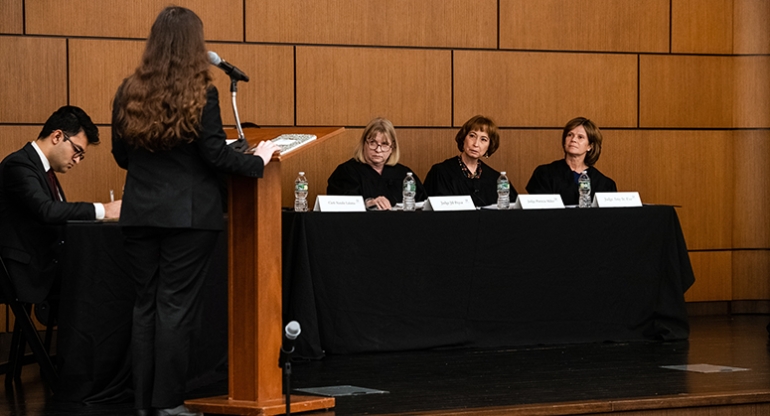Marden Moot Court finalists argue prisoners’ rights case before federal circuit judges
On March 29, in the final round of the 51st annual Orison S. Marden Moot Court Competition, the student finalists appeared before a three-judge panel—Judge Patricia Millett of the US Court of Appeals for the District of Columbia Circuit, Judge Jill Pryor of the US Court of Appeals for the Eleventh Circuit, and Judge Amy St. Eve of the US Court of Appeals for the Seventh Circuit—to argue complex prisoners’ rights issues in the fictitious case United States v. Paul Young.
The four finalists—Elizabeth Bays ’23, Jake Gold ’24, Ryan Shaffer ’24, and Aditya Trivedi ’24—won plaudits from the judges for their performance. “As you can imagine, we do a lot of moot courts, and we all agree that this one is truly extraordinary and outstanding,” said Pryor. “We go to a lot of great schools, we see a lot of great students, and so that’s a very big compliment.”
In the moot problem, prepared by Thomas Kicak ’23, Paul Young alleged that he suffered physical abuse by others incarcerated in the same federal prison. Guards either did nothing or struck him, Young claimed, and he was denied medical care afterward. Following nearly two years of trying to have his attorney file a claim against prison officials under the Federal Tort Claims Act (FTCA), Young hired a new lawyer. Worried about missing the two-year deadline for filing with the Bureau of Prisons, Young completed and mailed the claim form himself, but the Bureau of Prisons received it a day late and rejected it as untimely.
Young’s counsel subsequently filed suit, arguing that the prison mailbox rule, which defines an incarcerated litigant’s notice of appeal as timely if placed in the prison’s internal mailing system on or before the filing deadline, should have saved the application from rejection. The federal district court ruled that the rule didn’t apply because federal regulations define presentment of a claim as being received by a federal agency. The court also held that, even if the rule did apply, the prison mailbox rule was intended for pro se litigants, and Young had counsel at the time. The circuit court reversed the district court’s ruling on both grounds.
Representing the government, Shaffer argued that the prison mailbox rule did not extend to FTCA claims, while co-counsel Gold maintained that the rule applied only to pro se litigants. On behalf of the respondent, Bays countered that FTCA claims are indeed covered by the prison mailbox rule, and co-counsel Trivedi argued that the rule should apply to a “nominally represented” litigant.
After deliberating, the judges returned to announce their selection of Bays as best oral advocate and to provide feedback to the finalists. “Your audience,” said Millett, “is judges who have to go and write opinions…. What is the rule you want? What is the definition you want? What’s the dividing line that you want? And you all had thought about that really well and worked incredibly hard at it.”
Posted April 19, 2023



